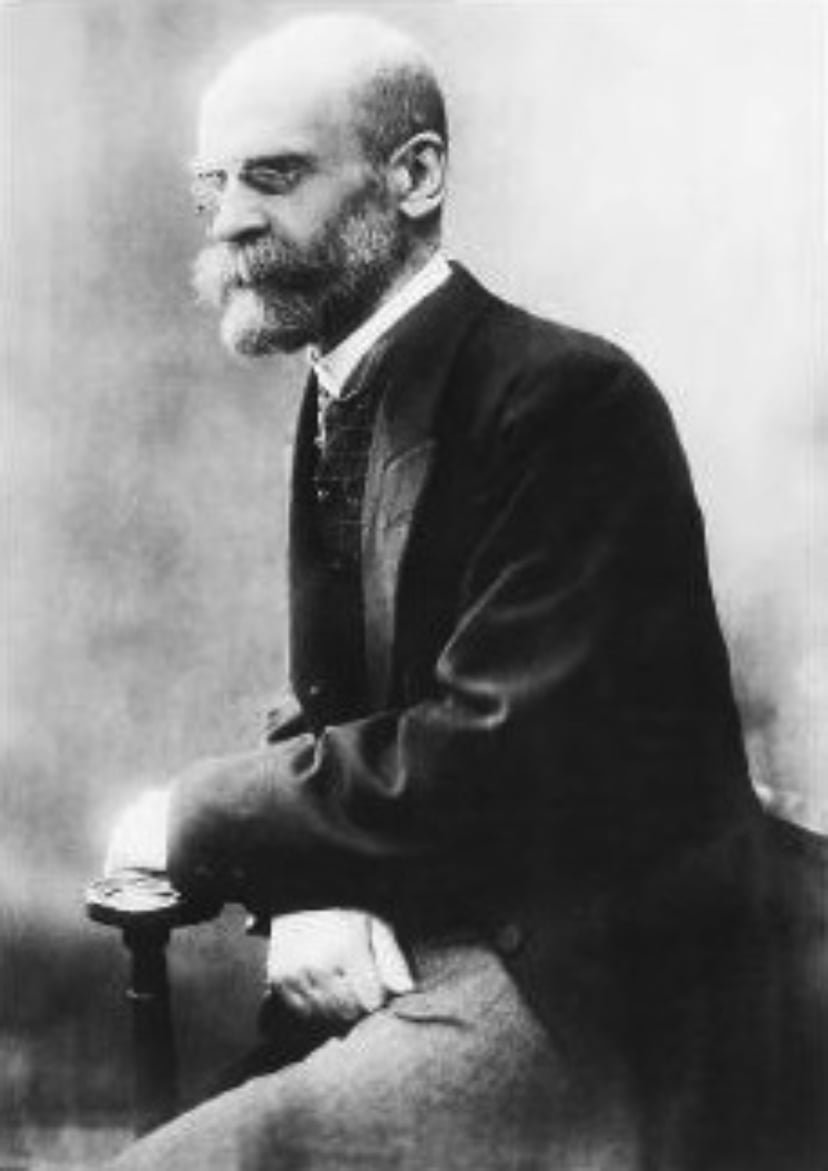

Himura Kenshin

|
緋村 剣心
|
|
|---|---|
| Alias |
Hitokiri Battōsai |
| Personal Description | |
| Birthday | June 20, 1849 |
| Age | 33 (end of series, Hokkaidō arc) |
| Gender | Male |
| Height | 158 cm (5’2″) |
| Weight | 48 kg (106 lbs) |
| Background | |
| Fighting Style | Hiten Mitsurugi-ryū |
| Weapons | Sakabatō Shinuchi |
| Occupation | Rurouni |
| Debut | |
| Episode | Act 1 |
| Anime movie | Episode 1 (2023 anime) |
Himura Kenshin, originally named Himura Shinta, is the protagonist of the Rurouni Kenshin series. Known as the legendary assassin Hitokiri Battōsai, Kenshin played a key role in the Meiji Revolution. After the conflict, he became a wandering swordsman (rurouni), seeking atonement for the lives he took by vowing never to kill again. He wields a reverse-blade sword (sakabatō) as a symbol of this vow.
|
Émile Durkheim
|
|
|---|---|
| Born |
David Émile Durkheim
15 April 1858 Épinal, France
|
| Died | 15 November 1917(aged 59)
Paris,France
|
| Nationality | French |
| Alma mater | École Normale Supérieure |
| Known for | Sacred–profane dichotomy Collective consciousness Social fact Social integration Anomie Collective effervescence |
| Scientific career | |
| Fields | Philosophy, sociology, education, anthropology, religious studies |
| Institutions | University of Paris, University of Bordeaux |
| Influences | Immanuel Kant, René Descartes,Plato, Herbert Spencer,Aristotle, Montesquieu, Jean-Jacques Rousseau, Auguste Comte. William James, John Dewey, Fustel de Coulanges, Jean-Marie Guyau, Charles Bernard Renouvier, John Stuart Mill |
| Influenced | Marcel Mauss,Claude Lévi-Strauss, Talcott Parsons, Maurice Halbwachs, Jonathan Haidt, Lucien Lévy-Bruhl,Bronisław Malinowski, Fernand Braudel, Pierre Bourdieu, Charles Taylor, Henri Bergson, Emmanuel Levinas, Steven Lukes, Alfred Radcliffe-Brown, E. E. Evans-Pritchard, Mary Douglas, Paul Fauconnet, Robert N. Bellah, Ziya Gökalp, David Bloor, Randall Collins, Neil Smelser[1] |
Appearance
Kenshin is of small stature, with long red hair tied in a ponytail and a distinct cross-shaped scar on his left cheek, a reminder of his past. He typically wears a faded red kimono and hakama, symbolizing his humble and wandering lifestyle.
Kuroko typically wears his Seirin High basketball uniform: a black and red jersey with the number 11. Outside of games, he dresses in casual attire, usually in simple, understated clothing.
Kenshin Himura, in the heat of battle, faces his enemies with unwavering resolve, his blade stained with the weight of his past and the blood of the present.
Personality
Kenshin is kind-hearted, soft-spoken, and selfless, often helping those in need. Despite his gentle demeanor, he carries the weight of his past and can become fiercely protective when the safety of others is threatened. His strong sense of justice often leads him into conflict, but he remains committed to his non-lethal philosophy.
Powers and Abilities

With calm determination, Kenshin Himura walks forward, his hand steady on the sword that once brought fear, now a symbol of his vow never to kill again.
As Hitokiri Battōsai, Kenshin was an unparalleled swordsman skilled in the ancient art of Hiten Mitsurugi-ryū, a technique that emphasizes speed and strength. Even after renouncing killing, his combat abilities remain formidable. His mastery of the battōjutsu (quick-draw technique) allows him to defeat opponents swiftly, even without lethal force.
- Superhuman Reflexes: Kenshin can react to attacks with near-instantaneous speed.
- Enhanced Agility: His agility and light-footedness make him a difficult target.
- Sakabatō Proficiency: Kenshin expertly wields the reverse-blade sword, using its blunt side to neutralize enemies without killing them.
Relationships
- Kaoru Kamiya: Kenshin forms a close bond withKaoru, the owner of the Kamiya Dōjō, where he eventually resides. She helps him embrace his new life and move on from his violent past.
- Sanosuke Sagara: A former fighter-for-hire, Sanosuke becomes Kenshin’s loyal friend and ally, often supporting him in battles.
- Yahiko Myōjin: Kenshin mentorsYahiko, a young orphan with a strong will to become a swordsman.
- Saitō Hajime: Kenshin shares a tense rivalry withSaitō, a former Shinsengumi officer, but they occasionally fight together when their goals align.
Trivia
- Kenshin’s cross-shaped scar was given to him by two individuals, each leaving a mark as a reminder of his tragic past.
- His name “Shinta” was changed to “Kenshin” by his master to better reflect his swordsman path, with “Ken” meaning sword and “Shin” meaning heart.